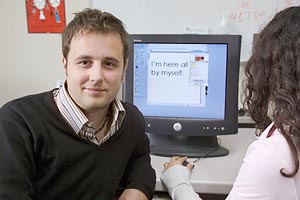| Those who lie online use more words than truth-tellers in chat room postings, messages, CU researchers find How to spot an online fibber: They talk too much, use more pronouns about others and use more terms about the senses, such as "see," "hear" and "feel," than people telling the truth, according to a new study by Cornell communication experts. "Our study suggests that people who are lying to another person in a chat room or in instant messaging use approximately one-third more words, probably in their attempt to construct a more cohesive and detailed story in order to seem believable," said Jeff Hancock, assistant professor of communication in the College of Agriculture and Life Sciences (CALS).  | | Jeff Hancock, assistant professor of communication in the College of Agriculture and Life Sciences (CALS) at Cornell, poses with a fabricated instant message on a computer in Kennedy Hall. Frank DiMeo/University Photography | "Perhaps more important is the finding that people being lied to also change the way they talk, even though they don't explicitly know they're being lied to," says Hancock, who found that targets of lies ask more questions and also use more words than when they are being told the truth. "Even though they were unaware of the deception manipulation, the data suggest that they were implicitly aware that they were being lied to." Hancock says that this may be another reason for the extra words: targets of deception may become skeptical and ask more questions than those receiving truthful information. Whereas other studies have shown that liars use fewer words, these studies examined deceptive monologues, not a conversation with a partner, and did not look at on-line communication, which gives people more time to prepare their responses. Hancock's finding that liars use more pronouns about others ("he," "she," "they") than truth-tellers is consistent with other research and is probably the liars' attempts to distance themselves from their deception and to keep the focus away from themselves. Most liars are accusers in chat room and blame people, that is where the "she", "he" or they comes into play. The study was presented at the annual meeting of the Cognitive Science Society, held in Chicago Aug. 4-8, and is published in the Proceedings of the 26th Annual Conference of the Cognitive Science Society (2004). Hancock's co-authors are Lauren E. Curry '04 (now at Fordham Law School), Saurabh Goorha M.S. '04 (now in the S.C. Johnson Graduate School of Management) and collaborator Michael T. Woodworth at Okanagan University College. The researchers studied 66 people and paired them up for a conversation via an instant messaging-type interface on computers, which eliminated all nonverbal communication. Participants were asked to discuss five assigned topics about themselves; one of each pair was randomly assigned to fabricate stories in two of their topics and was given examples about the kinds of lies to tell. They had five minutes to prepare. Although more research is needed to observe deceptive face-to-face conversations to see what happens when nonverbal cues are available, Hancock says that text-based communication is becoming increasingly ubiquitous. His findings suggest that researchers might be able to develop techniques to identify online communication that appears to be deceptive. Hancock's research last year found that people tend to lie more frequently on the phone or in person than they do in e-mail and instant messaging. Currently, he is conducting research on linguistic aspects of lying in face-to-face communication. The study was supported in part by the Department of Communication and a federal formula Hatch Grant. Click here for the continued Adventures of Vegas Babe |  Free Forum Hosting
Free Forum Hosting